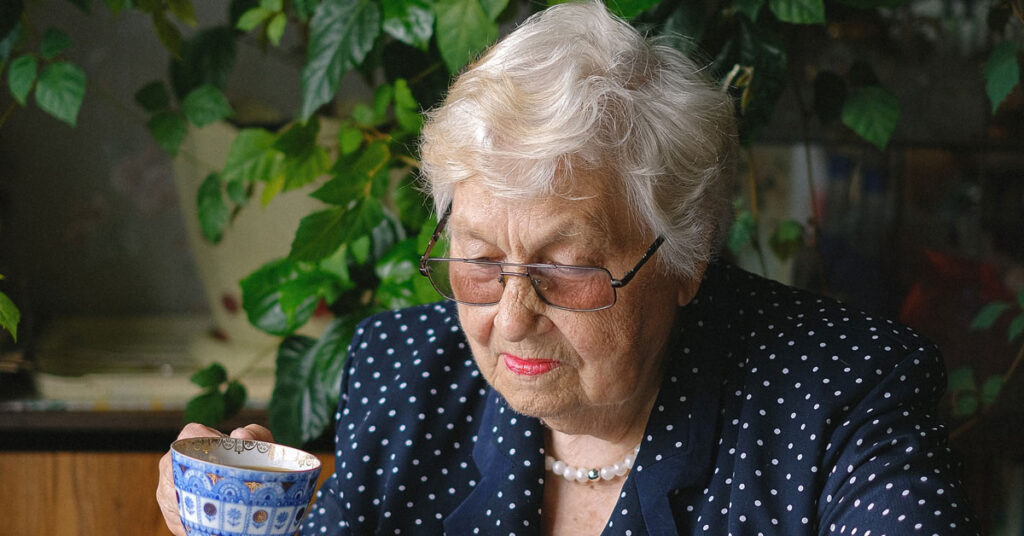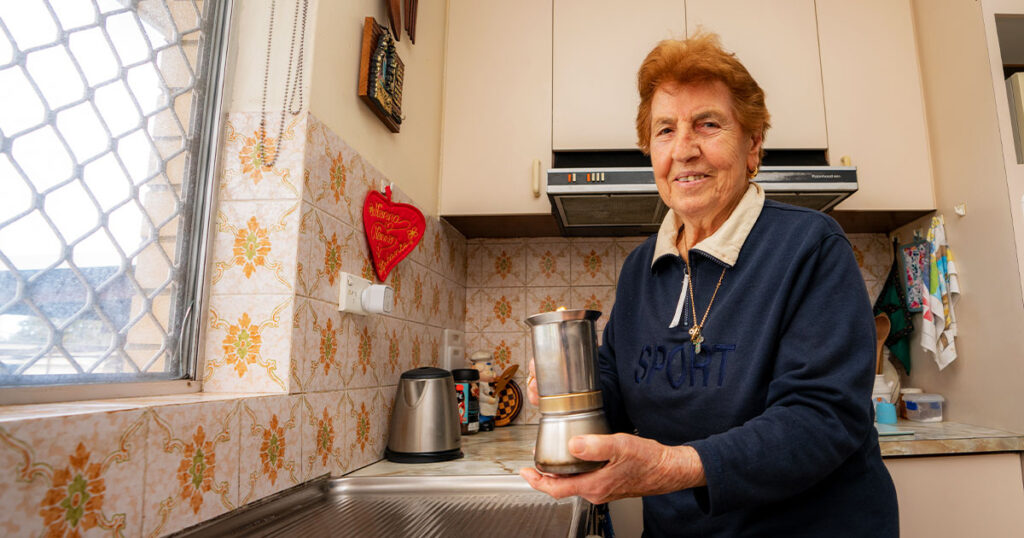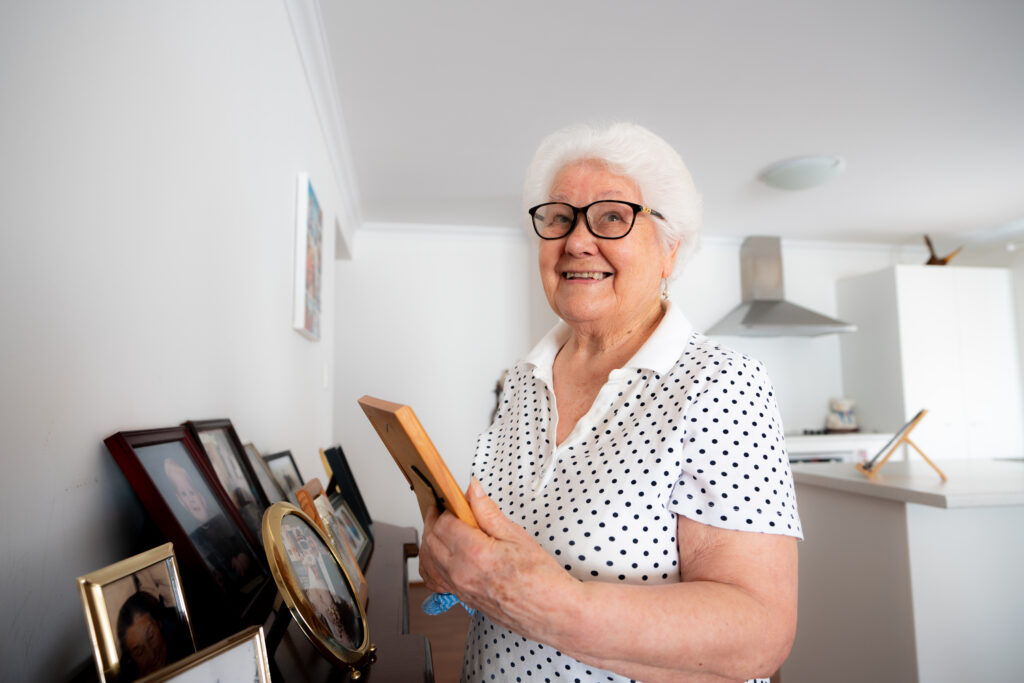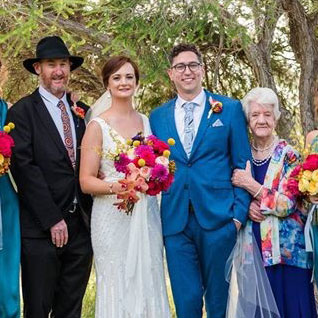It reads like a nightmare: through no fault of her own, an elderly lady with no family finds herself in residential care, stripped of her dignity, liberty and, potentially, her assets. But this is a true story about 87-year-old Queenslander June Smith.
It’s a story that started innocuously enough when June engaged a tradesman to do some work around her home in 2015. A story that ultimately resulted in June being hospitalised and then placed in residential care, with little or no consideration for her wishes.
And without her friend and neighbour Caroline and a home care solution with InteliLiving at its heart, June would still be stuck in a residential care home.
June loved her home and community.
In 2015, after 23 years in her home, June was an active and well-loved member of her close-knit community.
Sadly, her husband passed away shortly after they moved to the house, and June subsequently became estranged from her sister – without any children, her sister was her only remaining family.
June lived the life she wanted with her two-year-old Jack Russell, Patch.
But as a strong lady who, after working hard all her life, was financially independent, she lived the life she wanted with her two-year-old Jack Russell, Patch.
And crucially, aside from sleep apnoea – a sleep disorder where breathing repeatedly stops and starts during sleep – she enjoyed generally good mental and physical health.
The dishonest tradie and a well-meaning community worker.
June engaged a tradie – who offered to work cash-in-hand – to do some jobs around her home in 2015. She paid cash in advance for his services, but the tradie didn’t return to complete the work.
June called his employer to complain and the tradie lost his job, after which June became convinced that he was returning to her house to harass her and steal from her backyard.
June called the police on a number of occasions. The police, in turn, contacted the local community centre. And so, June’s real troubles began.
Over the next five years, June’s fear and insecurity grew. In fact, she became so disturbed that she brought more and more of the tools, furniture and materials in her garden into her house for safekeeping and called the police on a number of occasions.
In 2020, following another call from June, the police contacted the local community centre. They assigned a community worker to check in on June and make sure she was OK. And so, June’s real troubles began.
Meet Caroline, June’s friend and neighbour.
One day in mid-June 2020, June’s neighbour Caroline was gardening when she noticed an ambulance outside June’s home.
Worried about her neighbour, Caroline went over to speak to the ambulance crew, who were talking to June’s community worker, to find out what had happened.
Earlier that morning, at the community worker’s request, two hospital caseworkers had visited June. They had interrupted her as she was making her porridge and, while speaking to the caseworkers, June forgot that her oats were on the stove and the house became smoky.
The community worker then called in an ambulance crew, as well as a mental health worker, to conduct a care assessment.
This incident, combined with the clutter in June’s house, led the community worker to believe that June was struggling. The community worker then called in an ambulance crew, as well as a mental health worker, to conduct a care assessment.
As Caroline, June’s neighbour, said, “In retrospect, the community worker was right. Nobody in the neighbourhood realised the house was starting to get on top of June. We all look out for June – I’d mow her lawn, my daughter would walk Patch – but she’s a very private person, so we didn’t know what condition her home was in or that she may have been struggling to keep it clean and tidy.”
The slippery slope to residential care begins.
The meeting between the community and health workers resulted in June being taken to hospital for an assessment. They assured her it wouldn’t take long, so June didn’t even take an overnight bag.
But even at this early stage, knowing that June didn’t really have any family, neighbour Caroline had a bad feeling about the turn of events.
“The ambulance crew seemed reluctant to take June to hospital but took her anyway.”
“The ambulance crew seemed reluctant to take June to hospital but took her anyway. They seemed to think that it was unnecessary,” said Caroline. “And I agreed – she just needed a bit more help – but I thought it couldn’t hurt for June to have a quick check-up in hospital, so I told June we’d look after Patch and that we’d see her soon.”
As it turned out, June’s stay in hospital was anything but quick.
Four weeks in hospital, all without treating June’s condition.
June was admitted to hospital on 14 June 2020 and within a week the hospital had applied to Queensland Civil and Administrative Tribunal (QCAT), stating that she had ‘no capacity’ to look after herself.
The hospital diagnosed and treated a urinary tract infection (UTI), which can bring on fatigue and dizziness. Moreover, when Caroline explained that June had sleep apnoea and a CPAP machine – to help her breath and sleep properly at night – the hospital staff disregarded the information.
For Caroline, this was another major cause for concern. Untreated sleep apnoea often produces the same symptoms as dementia, affecting a person’s cognition and mental health.
“This is a lady who was always out and about. No medications. Not even a walking stick.”
In Caroline’s view, if June appeared confused and withdrawn, it could be a result of her UTI, her untreated sleep apnoea and the fact that June, a private person, had been taken from her quiet home and placed in a very noisy hospital ward. This last point was evidenced by the fact that June was treated for high blood pressure while in hospital, a condition she hadn’t suffered with before.
“This is a lady who was always out and about. No medications. Not even a walking stick,” said Caroline, who visited June regularly in hospital and made a point of taking her outside into the garden for some fresh air and quiet. “Now, she was stuck in a corner, wearing a monitoring bracelet and clearly traumatised. She felt like she was in prison. Overnight, she lost all control over her life.”
“She felt like she was in prison. Overnight, she lost all control over her life.”
In the absence of a friend or family guardian or trustee, QCAT appointed a public guardian and trustee to make decisions on June’s behalf.
Transferred to a care home and further down the rabbit hole.
After four weeks in hospital, being promised that she could go home soon, June was moved to a residential care home for respite care. This was at the request of the hospital and with the agreement of June’s public guardian and trustee, who hadn’t actually met or spoken to June.
Alarmed by June’s worsening wellbeing and situation, Caroline spoke up on her behalf. Caroline even offered to let her stay with her until June’s home could be cleaned and tidied and a suitable home care package put in place.
But the more Caroline spoke up on June’s behalf, the more suspicious and disobliging the hospital staff became, insinuating that Caroline’s interest in June wasn’t altruistic but financially motivated.
“She had a public guardian and trustee, so they could liquidate her assets and access her funds, all without any family interfering. It wasn’t right.”
June went into residential care in in mid-July. Again, the hospital and care home staff kept reassuring June that she would be able to go home; however, no effort had been made to prepare her home or home care, which led Caroline to believe that June had little or no chance of leaving the care home.
“For a care home, June is the perfect permanent resident,” said Caroline. “She has money and assets. She’d been assessed as ‘high needs.’ She had a public guardian and trustee, so they could liquidate her assets and access her funds, all without any family interfering. It wasn’t right.”
Caroline helps June get stronger and take on the care home.
June’s ‘respite’ care turned into a 12-week stay. Initially, the care home treated June with the same lack of care and respect as the hospital. That is, until Caroline said enough is enough.
“While June was in the care home, she spent most of her day cooped up in her room,” said Caroline. “Her physical and mental health were deteriorating.”
Caroline visited her at least every other day. She took June home with her for the day, eschewing her care-home-issued walking frame, so June enjoyed some exercise and the genuine, personal care so lacking at the care home.
“While June was in the care home, she spent most of her day cooped up in her room. Her physical and mental health were deteriorating.”
Despite objections from the care home, Caroline also insisted that June use her CPAP machine. She hoped that treating June’s sleep apnoea might reverse her cognitive decline. But even Caroline wasn’t prepared for the change in June.
“Within three days of using the CPAP machine, June was much stronger and fully cognisant,” said Caroline. “The transformation amazed everyone. And it was at this point that June asked me to become her guardian and trustee – to help her get her old life back.”
The QCAT hearing: The battle to get June’s home and life back.
With the care home, backed by the hospital and authorities, pushing to make June a permanent resident, Caroline and June prepared for a pivotal QCAT hearing that would determine June’s future.
During the two-day hearing, the care home and hospital representatives portrayed June as being incapable of making decisions for herself, let alone living at home. In some instances, they lied.
“For example, they said June couldn’t shower herself. This simply isn’t true,” said Caroline. “The care home was saying whatever they thought they needed to. They were doing everything to make June a permanent resident, regardless of what was best for her.”
“The care home portrayed June as being incapable of making decisions for herself, let alone living at home. In some instances, they lied.”
They also openly attacked Caroline’s character and motivations for helping June. Caroline and her husband – both Christians – had to defend themselves with character witness statements.
“I told June that if QCAT gave me guardianship, she could come home and stay with us until her home and home care package were sorted out,” said Caroline. “But I was losing hope. The care home and authorities were insisting June needed 24/7 care.”
“I thought, wow, if I can get hold of this monitoring system, it will counter their argument that June needs 24/7 care in a care home.”
Caroline had done a huge amount of research and work to create a plan that would allow June to return home. InteliLiving was a big part of the plan. It would enable Caroline to look out for June 24/7, without impinging on June’s life and privacy. And in turn, June would be able to prove she can live independently again.
“I thought, wow, if I can get hold of this monitoring system, it will counter their argument that June needs 24/7 care in a care home,” said Caroline.
And Caroline was right. The hearing concluded that Caroline should be made June’s guardian and that June be able to go home and get her life back, with Caroline looking out for June using InteliLiving and home care support funded by My Aged Care.
Now, June is home and living happily with InteliLiving.
Caroline officially became June’s legal guardian on 6 October and was able to bring June home with her on 13 October, so they could start getting June’s home and home care package in order. Then, on 4 December, after seven weeks staying with Caroline, June moved back to her own home, supported by InteliLiving.
Now, carers visit June every evening, so she doesn’t have to cook and clean anymore. She still looks after herself, getting herself up every morning, going to the shops and putting herself to bed every night. And she still makes her own breakfast – Caroline bought a microwave for June, which June had to learn how to use, so she can make her porridge.
Now, through InteliLiving, Caroline can see that June is making her breakfast and eating regularly throughout the day. Indeed, if June had InteliLiving installed in her home earlier, her UTI and cognitive decline could have been detected and addressed sooner. Her hospitalisation and the battle to regain her independence could have been avoided all together.
“We put sensors in every room … so if I spot anything out of the ordinary on the InteliLiving app I can check in on the phone or by popping over the road.”
Both June and Caroline love their InteliLiving system. “For me,” said Caroline, “it means I can look out for June, while giving her the privacy and respect she deserves.
“We put sensors in every room and on some of June’s plugs, so if I spot anything out of the ordinary on the InteliLiving app I can check in on the phone or by popping over the road. She doesn’t need a babysitter. She just needs some help and support.
“For June, InteliLiving provides complete peace of mind,” explained Caroline. “She understands exactly how the system works and likes the fact that it doubles as a security system. The external door and patios sensors mean I can tell if June is unsettled in the night or if anyone enters June’s backyard and approaches her house.
“She doesn’t need a babysitter. She just needs some help and support.”
“Without InteliLiving, everything would be much more difficult to manage for both June and me. Supporting June so she can live at home would be much more stressful. And because InteliLiving is approved by My Aged Care, the whole thing is paid for out of June’s home care package, so it doesn’t cost her a cent.”
Without Caroline, June would be languishing in a care home, existing rather than living, without any control over her life. Today, thanks to Caroline and Caroline’s family, who were supported by friends throughout June’s six-month ordeal, and InteliLiving, June is living independently in her treasured home and enjoying life again. To find out more about InteliLiving, visit intelicare.com.au
*The names in this case study have been changed to preserve our clients’ privacy.







